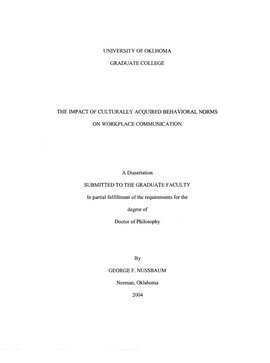| dc.contributor.advisor | Henderson, George, | en_US |
| dc.contributor.author | Nussbaum, George F. | en_US |
| dc.date.accessioned | 2013-08-16T12:19:25Z | |
| dc.date.available | 2013-08-16T12:19:25Z | |
| dc.date.issued | 2004 | en_US |
| dc.identifier.uri | https://hdl.handle.net/11244/740 | |
| dc.description.abstract | This study explored cultural diversity influences on the concepts of time and punctuality; allowable limits of expressiveness; kinesics and oculesic cues; request/response time; and ethnic and gender preferences for supervisors. The research was conducted using participant volunteer personnel in a large U.S. Army Medical. | en_US |
| dc.description.abstract | Using the theoretical background of Blumer's Symbolic Interactionalism, thirty-two volunteer participants were individually interviewed in a qualitative, grounded theory research design study. The study population consisted of active duty military personnel with equal representation of males and females and officers and enlisted personnel from African-American and Euro-American heritage. Analysis of the data revealed a central theme of interpersonal relationship expectations. The responses provided in four vignettes exploring time, punctuality, expressiveness, kinesics and oculesic characteristics, request/response time, and preference choices for supervisors revealed that the African-American participants communicated workplace relationship efforts with an orientation toward an interpersonal approach (collectivistic). The participants from Euro-American heritages approached most workplace relationships from a "business only" perspective (individualistic). The findings suggest that relationship expectations have a cultural basis in some of the miscues in work environment communication. Further research among other population and ethnic groups to corroborate this theory. | en_US |
| dc.format.extent | xi, 373 leaves ; | en_US |
| dc.subject | Intercultural communication United States. | en_US |
| dc.subject | Sociology, Industrial and Labor Relations. | en_US |
| dc.subject | Symbolic interactionism. | en_US |
| dc.subject | Whites United States Psychology. | en_US |
| dc.subject | Interpersonal relations United States. | en_US |
| dc.subject | African Americans Psychology. | en_US |
| dc.subject | Business Administration, Management. | en_US |
| dc.subject | Speech Communication. | en_US |
| dc.subject | Sociology, Ethnic and Racial Studies. | en_US |
| dc.subject | Communication in organizations. | en_US |
| dc.title | The impact of culturally acquired behavioral norms on workplace communication. | en_US |
| dc.type | Thesis | en_US |
| dc.thesis.degree | Ph.D. | en_US |
| dc.thesis.degreeDiscipline | Department of Communication | en_US |
| dc.note | Source: Dissertation Abstracts International, Volume: 65-04, Section: A, page: 1552. | en_US |
| dc.note | Major Professor: George Henderson. | en_US |
| ou.identifier | (UMI)AAI3128841 | en_US |
| ou.group | College of Arts and Sciences::Department of Communication | |
